... newer stories
Wednesday, 24. January 2007
Media on Carter's visit
"The Boston Globe" article with additional information and video clips of the talk:
http://www.boston.com/news/local/articles/2007/01/24/carter_wins_applause_at_brandeis/
"The New York Times": http://www.nytimes.com/2007/01/24/us/24carter.html?_r=1&oref=slogin
CBS News: http://www.cbsnews.com/stories/2007/01/24/ap/national/mainD8MRDE7G0.shtml
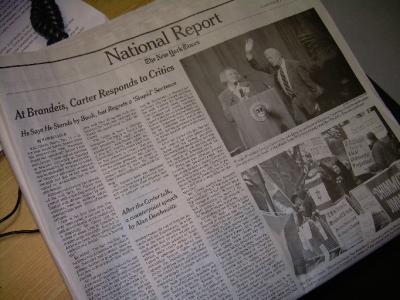
Moreover...
Read "Jimmy Carter's 'Peace' Mission To Brandeis" in the Washington Post: http://www.washingtonpost.com/wp-dyn/content/article/2007/01/23/AR2007012301668.html
Watch NECN's coverage of the addresses:
http://www.boston.com/partners/worldnow/necn.html?catID=80781&clipid=1189510&autoStart=true&mute=false&continuous=true
Watch CNN's coverage of the event:
http://www.cnn.com/video/partners/clickability/index.html?url=/video/politics/2007/01/24/costello.carter.apology.mxf.cnn
http://www.boston.com/news/local/articles/2007/01/24/carter_wins_applause_at_brandeis/
"The New York Times": http://www.nytimes.com/2007/01/24/us/24carter.html?_r=1&oref=slogin
CBS News: http://www.cbsnews.com/stories/2007/01/24/ap/national/mainD8MRDE7G0.shtml

Moreover...
Read "Jimmy Carter's 'Peace' Mission To Brandeis" in the Washington Post: http://www.washingtonpost.com/wp-dyn/content/article/2007/01/23/AR2007012301668.html
Watch NECN's coverage of the addresses:
http://www.boston.com/partners/worldnow/necn.html?catID=80781&clipid=1189510&autoStart=true&mute=false&continuous=true
Watch CNN's coverage of the event:
http://www.cnn.com/video/partners/clickability/index.html?url=/video/politics/2007/01/24/costello.carter.apology.mxf.cnn
ieva jusionyte, 10:03h
... link (0 Kommentare) ... comment
Tuesday, 23. January 2007
Carter on Palestine and Israel
Today the 39th President of the United States, Jimmy Carter, spoke to Brandeis students and faculty about his new book "Palestine: Peace, not Apartheid", which had been seen as a controversial account of Palestinian-Israeli relations.

The very fact that President Carter did come to Brandeis, a primarily American-Jewish university (even if a really good one), is important. At the beginning of his speach Carter - probably joking, but who knows - said that this was the second most exciting invitation to speak he has got in his life, the first one being when he was elected as President. And, he added, also the second most covered by the media. If Brandeis had not accepted him, it would have been a huge scandal, it even was already one in the articles published by "The Boston Globe" that revealed the divisions within Brandeis community between conservative administration, dependent on the Jewish sponsors, and its faculty and students. Therefore, this invitation, organized by student and faculty committee, not the administration (Brandeis president Jehuda Reinhartz did not attend the event at all), is a historical event for this university and also significant for the dialogue on the Middle East in the United States in general.
The gymnasium was full of students, the rest, who did not manage to get tickets to the event, had to remain outside with the banners either supporting or protesting. Well, what did he say? Carter's talk was really good, but even better were his answers to rather radical and straightforward questions by the students, one of them our Simon Puetzstueck from Bonn. The main ideas are clear... In order to reach peace in the Middle East Israel has to withdraw from the occupied Palestinian territories. The wall, which, as some student mentioned, "has proved to be successful means of countering terrorism as suicide attacks have decreased by 95 percent", would not be objected to by the international community and human rights organizations if it was on the so-called 'green line', but it does go deep into Palestinian lands, therefore, is not a border, is not justified at all. Moreover, America should not act unilaterally in the peace process, it must work together with the European Union, Russia and Israeli and Palestinian authorities, the latter represented by Abbas as the leader of all Palestinians. He also recalled the aftermath of Camp David accords and Oslo in 1993 and stated that it was Israel's fault that peace has not been reached until now since it never complied to the agreements written in black on white.
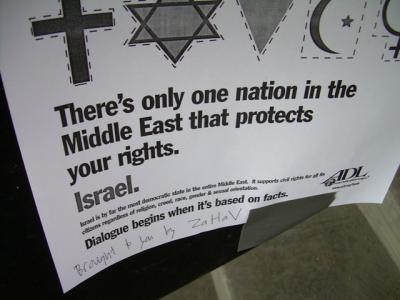
Reacting to some objecting questions twice Carter suggested to form a group of students and professors and just go and see for ourselves what the situation in the West Bank is. Palestinians are enclaved, banned from roads that are connecting the Izraeli settlements, deprived of basic human rights. There was some tone of teaching or educating in his speech. For example several times he repeated that the Jewish religion is based on the strive for justice and righteousness. And even refered to Brandeis as an institution named in honor of Supreme Court Justice Louis Brandeis. He believed, or maybe chose to believe, that students can understand what is just and what is unjust. And many times supported his statements with statistics, according to which both Izraelis and Palestinians more or less agree with peace accords, however, it is the radical forces that are to be blamed for violating them.
It really felt so good to listen to someone, who, even if he hasn't achieved a lot during his years in presidency, has enough experience to talk about the subject as well as does not lack intelligence and courage to talk openly. Surely, after some strong remarks the President was interrupted by loud applause, although it was clear that not all of Brandeis community agreed to what he was saying and quite a lot of them remained silent. Since morning the campaign againts his position was all over campus... dozens, if not hundreds, of white papers posted all over the place called for wearing "the star" or "the cross" as marks of identification and protest and continuously asked the question: "What is the only state in the Middle East that allows freedom of press?" The answer was written underneath: "Israel". However, Carter understood that his visit is a move forward for Brandeis as it legitimizes discussions on the subject which in many cases is forbidden. And, furthermore, he did talk honestly... "He is a good man", later said Simon. Just a good man and during his years in the White House too many abused this knowledge. In the question-answer session he even appologized for a sentence in his book that says that the suicide attacks should stop AFTER Israel recognized full Palestinian sovereignty and assured that in new editions this mistake will not be repeated. And, being as kind as he seemed, he promised to answer the rest of the questions, for which he did not have time, by e-mail:)
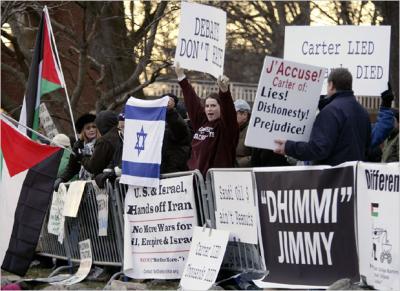
Since the initial idea of Brandeis administration had been to organize a debate between Carter and Harvard professor Alan Dershowitz, who is the most fierce critic of the book, but Carter did not agree, after the President left, Dershowitz did come to speak in the same place, even though for a slightly different audience. To deny everything and build up strong support and belief in Israel's politics. But who cares now? During his speech Carter said that Brandeis students do not need some Harvard professor to tell them what is right. And this sentence was welcomed with extremely loud applause. Probably the thought is immature, but maybe peace in the Middle East lies within the hands of young people like these, who have come from serving years in the Izraeli army, but are are so understanding and open for dialogue. Although not all are... Oh, what an interesting, complicated, but promising place Brandeis is!

The very fact that President Carter did come to Brandeis, a primarily American-Jewish university (even if a really good one), is important. At the beginning of his speach Carter - probably joking, but who knows - said that this was the second most exciting invitation to speak he has got in his life, the first one being when he was elected as President. And, he added, also the second most covered by the media. If Brandeis had not accepted him, it would have been a huge scandal, it even was already one in the articles published by "The Boston Globe" that revealed the divisions within Brandeis community between conservative administration, dependent on the Jewish sponsors, and its faculty and students. Therefore, this invitation, organized by student and faculty committee, not the administration (Brandeis president Jehuda Reinhartz did not attend the event at all), is a historical event for this university and also significant for the dialogue on the Middle East in the United States in general.
The gymnasium was full of students, the rest, who did not manage to get tickets to the event, had to remain outside with the banners either supporting or protesting. Well, what did he say? Carter's talk was really good, but even better were his answers to rather radical and straightforward questions by the students, one of them our Simon Puetzstueck from Bonn. The main ideas are clear... In order to reach peace in the Middle East Israel has to withdraw from the occupied Palestinian territories. The wall, which, as some student mentioned, "has proved to be successful means of countering terrorism as suicide attacks have decreased by 95 percent", would not be objected to by the international community and human rights organizations if it was on the so-called 'green line', but it does go deep into Palestinian lands, therefore, is not a border, is not justified at all. Moreover, America should not act unilaterally in the peace process, it must work together with the European Union, Russia and Israeli and Palestinian authorities, the latter represented by Abbas as the leader of all Palestinians. He also recalled the aftermath of Camp David accords and Oslo in 1993 and stated that it was Israel's fault that peace has not been reached until now since it never complied to the agreements written in black on white.

Reacting to some objecting questions twice Carter suggested to form a group of students and professors and just go and see for ourselves what the situation in the West Bank is. Palestinians are enclaved, banned from roads that are connecting the Izraeli settlements, deprived of basic human rights. There was some tone of teaching or educating in his speech. For example several times he repeated that the Jewish religion is based on the strive for justice and righteousness. And even refered to Brandeis as an institution named in honor of Supreme Court Justice Louis Brandeis. He believed, or maybe chose to believe, that students can understand what is just and what is unjust. And many times supported his statements with statistics, according to which both Izraelis and Palestinians more or less agree with peace accords, however, it is the radical forces that are to be blamed for violating them.
It really felt so good to listen to someone, who, even if he hasn't achieved a lot during his years in presidency, has enough experience to talk about the subject as well as does not lack intelligence and courage to talk openly. Surely, after some strong remarks the President was interrupted by loud applause, although it was clear that not all of Brandeis community agreed to what he was saying and quite a lot of them remained silent. Since morning the campaign againts his position was all over campus... dozens, if not hundreds, of white papers posted all over the place called for wearing "the star" or "the cross" as marks of identification and protest and continuously asked the question: "What is the only state in the Middle East that allows freedom of press?" The answer was written underneath: "Israel". However, Carter understood that his visit is a move forward for Brandeis as it legitimizes discussions on the subject which in many cases is forbidden. And, furthermore, he did talk honestly... "He is a good man", later said Simon. Just a good man and during his years in the White House too many abused this knowledge. In the question-answer session he even appologized for a sentence in his book that says that the suicide attacks should stop AFTER Israel recognized full Palestinian sovereignty and assured that in new editions this mistake will not be repeated. And, being as kind as he seemed, he promised to answer the rest of the questions, for which he did not have time, by e-mail:)

Since the initial idea of Brandeis administration had been to organize a debate between Carter and Harvard professor Alan Dershowitz, who is the most fierce critic of the book, but Carter did not agree, after the President left, Dershowitz did come to speak in the same place, even though for a slightly different audience. To deny everything and build up strong support and belief in Israel's politics. But who cares now? During his speech Carter said that Brandeis students do not need some Harvard professor to tell them what is right. And this sentence was welcomed with extremely loud applause. Probably the thought is immature, but maybe peace in the Middle East lies within the hands of young people like these, who have come from serving years in the Izraeli army, but are are so understanding and open for dialogue. Although not all are... Oh, what an interesting, complicated, but promising place Brandeis is!
ieva jusionyte, 21:10h
... link (0 Kommentare) ... comment
Hrant's funeral
Today in Istanbul hundreds of thousands are saying good-bye to Hrant Dink, murnered in front of his newspaper's offices last Friday.
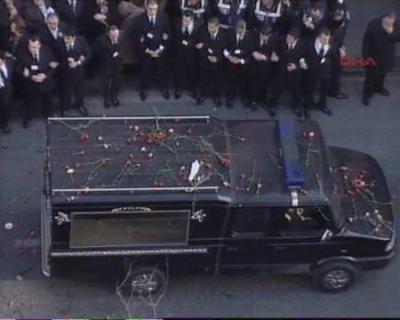
(picture from http://www.hurriyet.com.tr/english/5823943.asp#)
Here is the last editorial of the Turkish-Armenian writer and journalist:
"The Pigeon-like Unease of My Inner Spirit"
by Hrant Dink
AGOS Newspaper
10 January 2007
I did not at first feel troubled about the investigation that was filed against me by the Şişli public prosecutor’s office with the accusation of “insulting Turkishness.” This was not the first time. I had been familiar to the accusation because of a similar lawsuit I had filed against me in Urfa. I was being tried in Urfa with the accusation of “denigrating Turkishness” over the past three years for having stated in a talk I gave at a conference there in 2002 that “I was not a Turk…but from Turkey and an Armenian.” And I was even unaware about how the lawsuit was proceeding. I was not at all interested. My lawyer friends in Urfa were attending the hearings in my absence.
I was even quite nonchalant when I went and gave my deposition to the Şişli public prosecutor. I ultimately had complete trust in what my intentions had been and what I had written. Once the prosecutor [had the chance] to evaluated not that single sentence from my editorial alone which made no sense by itself but the text as a whole, he would understand with great ease that I had no intention to “denigrate Turkishness” and this comedy would come to an end.
I was certain that a lawsuit would not be filed at the end of the investigation. I was sure of myself. But surprise! A lawsuit was filed.
But I still did not lose my optimism.
So much so that at a television show that I joined live, I even told the lawyer [Kemal] Kerincsiz who was accusing me “that he should not get his hopes too high, that I was not going to be smacked with any sentence from this lawsuit, and that I would leave this country if I received a sentence.” I was sure of myself because I truly had not had in my article any premeditation or intention – not even a single iota – to denigrate Turkishness. Those who read the entirety of my collection of articles would understand this very clearly.
As a matter of fact, the report prepared by the three faculty members from Istanbul University who had been appointed by the court as experts stated exactly that. There was no reason for me to get troubled, there would certainly be a return from the wrongful path [of the lawsuit] at one stage of the proceedings or the other. So I kept asking for patience… But there was no such return.
The prosecutor asked for a sentence in spite of the expert report. The judge then sentenced me to six months in prison. When I first heard about my sentence, I found myself under the bitter pressure of the hopes I had nurtured all along the process of the lawsuit. I was bewildered… My disappointment and rebellion were at their pinnacle.
I had resisted for days and months saying “just you wait for this decision to come out and once I am acquitted, then you will all be so repentant about all that you have said and written.”
In covering every hearing of the lawsuit, the newspapers items, editorials and television programs all referred to how I had said that “the blood of the Turk is poisonous.” Each and every time, they were adding to my fame as “the enemy of the Turk.” At the halls of the court, the fascists physically attacked me with racist curses. They bombarded me with insults on their placards. The threats reaching hundreds that kept hailing for months through phones, e-mail and letters kept increasing each time.
And I persevered through all this with patience awaiting the decision for acquittal. Once the legal decision was announced, the truth was going to prevail and all these people would be ashamed of what they had done.
My only weapon was my sincerity. But here the decision was out and all my hopes were crushed. From then on, I was in the most distressed situation that a person could possibly be in. The judge had made a decision in the name of the “Turkish nation” and had it legally registered that I had “denigrated Turkishness.” I could have persevered through anything except this. According to my understanding, racism was the denigration by anyone of a person they lived alongside with on the basis of any difference, ethnic or religious and there was not any way in which this could ever be forgiven. Well it was in this psychological state that I made the following declaration to the members of the media and friends who were at my doorstep trying to confirm “as to whether I would leave this country as I had indicated earlier:” “I shall consult with my lawyers. I will appeal at the supreme court of appeal and will even go to the European Court of Human Rights if necessary. If I am not cleared through any one of these processes, then I shall leave my country. Because according to my opinion, someone who has been sentenced with such a crime does not have the right to live alongside the citizens whom he has denigrated.”
As I voiced this opinion, I was emotional as always. My only weapon was my sincerity.
Dark Humor
But it so happens that the deep force that was trying to single me out and make me an open target in the eyes of the people of Turkey found something wrong with this press release of mine as well and this time filed a lawsuit against me for attempting to influence the court. The entire Turkish media had given my declaration but what got their attention was what was writ in AGOS alone. And it so transpired that the legally responsible parties in the AGOS newspaper and I started to be tried this time around for attempting to influence the court. This must be what people call “dark humor.”
As I am the accused, who has the right more than the accused to try to influence the judiciary? But look at this humorous situation that the accused is this time tried for trying to influence the judiciary.
“In the Name of the Turkish State”
I have to confess that I had more than lost my trust in the concept of “Law” and the “System of Justice” in Turkey. How could I have not? Had these prosecutors, these judges not been educated in the university, graduated from faculties of law? Weren’t they supposed to have the capacity to comprehend [and interpret] what they read? But it so transpires that the judiciary in this country, as also expressed without compunction by many a statesman and politician, is not independent. The judiciary does not protect the rights of the citizen, but instead the State. The judiciary is not there for the citizen, but under the control of the State.
As a matter of fact I was absolutely sure that even though it was stated that the decision in my case was reached “in the name of the Turkish nation,” it was a decision clearly not made “on behalf of the Turkish nation” but rather “on behalf of the Turkish state.” As a consequence, my lawyers were going to appeal the Supreme Court of Appeals, but what could guarantee that the deep forces that had decided to put me in my place would not be influential there either?
And was it the case that the Supreme Court of Appeals always reached right decisions?
Wasn’t it the same Supreme Court of Appeal that had signed onto the unjust decision that stripped minority foundations of their properties? [And had done so] in spite of the attempts of the Chief Public Prosecutor.
And we did appeal and what did it get us?
Just like the report of the experts, the Chief Public Prosecutor of the Supreme Court of Appeals stated that there was no evidence of crime and asked for my acquittal but the Supreme Court of Appeals still found me guilty.
The Chief Public Prosecutor of the Supreme Court of Appeals was just as certain about what he had read and understood as I had been about what I had written, so he objected to the decision and took the lawsuit to the General Council. But what can I say, that great force which had decided once and for all to put me in my place and had made itself felt at every stage of my lawsuit through processes I would not even know about was there present once again behind the scenes. And as a consequence, it was declared by majority vote at General Council as well that I had denigrated Turkishness.
Like a Pigeon
This much is crystal clear that those who tried to single me out, render me weak and defenseless succeeded by their own measures. With the wrongful and polluted knowledge they oozed into society, they managed to form a significant segment of the population whose numbers cannot be easily dismissed who view Hrant Dink as someone “denigrating Turkishness.”
The diary and memory of my computer are filled with angry, threatening lines sent by citizens from this particular sector. (Let me note here at this juncture that even though one of these letters was sent from [the neighboring city of] Bursa and that I had found it rather disturbing because of the proximity of the danger it represented and [therefore] turned the threatening letter over to the Şişli prosecutor’s office, I have not been able to get a result until this day.)
How real or unreal are these threats? To be honest, it is of course impossible for me to know for sure.
What it truly threatening and unbearable for me is the psychological torture I personally place myself in. “Now what are these people thinking about me?” is the question that really bugs me.
It is unfortunate that I am now better known than I once was and I feel much more the people throwing me that glance of “Oh, look, isn’t he that Armenian guy?” And I reflexively start torturing myself.
One aspect of this torture is curiosity, the other unease. One aspect is attention, the other apprehension. I am just like a pigeon….. Obsessed just as much what goes on my left, right, front, back. My head is just as mobile… and fast enough to turn right away.
And Here is the Cost for You
What did the Foreign Minister Abdullah Gül state? The Justice Minister Cemil Çiçek?
“Come on, there is nothing to exaggerate about [legal code 301]. Is there anyone who has actually been tried and imprisoned from it?”
As if the only cost one paid was imprisonment...
Here is a cost for you... Here is a cost...
Do you know, oh ministers, what kind of a cost it is to imprison a human being into the apprehensiveness of a pigeon?... Do you know?....
You, don’t you ever watch a pigeon?
What They Call “Life-or-Death”
What I have lived through has not been an easy process… And what we have lived through as a family…
There were moments when I seriously thought about leaving the country and moving far away.
And especially when the threats started to involve those close to me…
At that point I always remained helpless.
That must be what they call “Life-or-Death.” I could have resisted out of my own will, but I did not have the right to put into danger the life of anyone who was close to me. I could have been my own hero, but I did not have the right to be brave by placing, let along someone close to me, any other person in danger.
During such helpless times, I gathered my family, my children together and sought refuge in them and received the greatest support from them. They trusted in me. Wherever I would be, they would be there as well.
If I said “let’s go” they would go, if I said “let’s stay” they would come.
To Stay and Resist
Okay, but if we went, where would we go?
To the Armenian Republic?
How long someone like me who could not stand injustices put up with the injustices there? Would not I get into even deeper trouble there? To go and live in the European countries was not at all the thing for me.
After all, I am such a person that if I travel to the West for three days, I miss my country on the fourth and start writhing in boredom saying “let this be over so I can go back,” so what would I end up doing there?
The comfort there would have gotten to me!
Leaving “boiling hells” for “ready-made heavens” was not at all right for my personality make up.
We were people who volunteered to transform the hells they lived into heavens.
To stay and live in Turkey was necessary because we truly desired it and [had to do so] out of respect to the thousands of friends in Turkey who gave a struggle for democracy and who supported us.
We were going to stay and we were going to resist.
If we were forced to leave one day however... We were going to set out just as in 1915...Like our ancestors... Without knowing where we were going... Walking the roads they walked through... Feeling the ordeal, experiencing the pain....
With such a reproach we were going to leave our homeland. And we would go where our feet took us, but not our hearts.
Apprehensive and Free
I wish that we would never ever have to experience such a departure. We have way too many reasons and hope not to experience it anyhow. Now I am applying to the European Court of Human Rights.
How long this lawsuit will last, I do not know.
The fact that I do know and that somewhat puts me at ease is that I will be living in Turkey at least until the lawsuit is finalized.
If the court decides in my favor, I will undoubtedly become very happy and it would mean that I would never have to leave my country.
From my own vantage point, 2007 will probably be even a more difficult year.
The trials will continue, new ones will commence. Who knows what kinds of additional injustices I would have to confront?
While all these occur, I will consider this one truth my only security.
Yes, I may perceive myself in the spiritual unease of a pigeon, but I do know that in this country people do not touch pigeons.
Pigeons live their lives all the way deep into the city, even amidst the human throngs.
Yes, somewhat apprehensive but just as much free.
(translated by F.M. Gocek)

(picture from http://www.hurriyet.com.tr/english/5823943.asp#)
Here is the last editorial of the Turkish-Armenian writer and journalist:
"The Pigeon-like Unease of My Inner Spirit"
by Hrant Dink
AGOS Newspaper
10 January 2007
I did not at first feel troubled about the investigation that was filed against me by the Şişli public prosecutor’s office with the accusation of “insulting Turkishness.” This was not the first time. I had been familiar to the accusation because of a similar lawsuit I had filed against me in Urfa. I was being tried in Urfa with the accusation of “denigrating Turkishness” over the past three years for having stated in a talk I gave at a conference there in 2002 that “I was not a Turk…but from Turkey and an Armenian.” And I was even unaware about how the lawsuit was proceeding. I was not at all interested. My lawyer friends in Urfa were attending the hearings in my absence.
I was even quite nonchalant when I went and gave my deposition to the Şişli public prosecutor. I ultimately had complete trust in what my intentions had been and what I had written. Once the prosecutor [had the chance] to evaluated not that single sentence from my editorial alone which made no sense by itself but the text as a whole, he would understand with great ease that I had no intention to “denigrate Turkishness” and this comedy would come to an end.
I was certain that a lawsuit would not be filed at the end of the investigation. I was sure of myself. But surprise! A lawsuit was filed.
But I still did not lose my optimism.
So much so that at a television show that I joined live, I even told the lawyer [Kemal] Kerincsiz who was accusing me “that he should not get his hopes too high, that I was not going to be smacked with any sentence from this lawsuit, and that I would leave this country if I received a sentence.” I was sure of myself because I truly had not had in my article any premeditation or intention – not even a single iota – to denigrate Turkishness. Those who read the entirety of my collection of articles would understand this very clearly.
As a matter of fact, the report prepared by the three faculty members from Istanbul University who had been appointed by the court as experts stated exactly that. There was no reason for me to get troubled, there would certainly be a return from the wrongful path [of the lawsuit] at one stage of the proceedings or the other. So I kept asking for patience… But there was no such return.
The prosecutor asked for a sentence in spite of the expert report. The judge then sentenced me to six months in prison. When I first heard about my sentence, I found myself under the bitter pressure of the hopes I had nurtured all along the process of the lawsuit. I was bewildered… My disappointment and rebellion were at their pinnacle.
I had resisted for days and months saying “just you wait for this decision to come out and once I am acquitted, then you will all be so repentant about all that you have said and written.”
In covering every hearing of the lawsuit, the newspapers items, editorials and television programs all referred to how I had said that “the blood of the Turk is poisonous.” Each and every time, they were adding to my fame as “the enemy of the Turk.” At the halls of the court, the fascists physically attacked me with racist curses. They bombarded me with insults on their placards. The threats reaching hundreds that kept hailing for months through phones, e-mail and letters kept increasing each time.
And I persevered through all this with patience awaiting the decision for acquittal. Once the legal decision was announced, the truth was going to prevail and all these people would be ashamed of what they had done.
My only weapon was my sincerity. But here the decision was out and all my hopes were crushed. From then on, I was in the most distressed situation that a person could possibly be in. The judge had made a decision in the name of the “Turkish nation” and had it legally registered that I had “denigrated Turkishness.” I could have persevered through anything except this. According to my understanding, racism was the denigration by anyone of a person they lived alongside with on the basis of any difference, ethnic or religious and there was not any way in which this could ever be forgiven. Well it was in this psychological state that I made the following declaration to the members of the media and friends who were at my doorstep trying to confirm “as to whether I would leave this country as I had indicated earlier:” “I shall consult with my lawyers. I will appeal at the supreme court of appeal and will even go to the European Court of Human Rights if necessary. If I am not cleared through any one of these processes, then I shall leave my country. Because according to my opinion, someone who has been sentenced with such a crime does not have the right to live alongside the citizens whom he has denigrated.”
As I voiced this opinion, I was emotional as always. My only weapon was my sincerity.
Dark Humor
But it so happens that the deep force that was trying to single me out and make me an open target in the eyes of the people of Turkey found something wrong with this press release of mine as well and this time filed a lawsuit against me for attempting to influence the court. The entire Turkish media had given my declaration but what got their attention was what was writ in AGOS alone. And it so transpired that the legally responsible parties in the AGOS newspaper and I started to be tried this time around for attempting to influence the court. This must be what people call “dark humor.”
As I am the accused, who has the right more than the accused to try to influence the judiciary? But look at this humorous situation that the accused is this time tried for trying to influence the judiciary.
“In the Name of the Turkish State”
I have to confess that I had more than lost my trust in the concept of “Law” and the “System of Justice” in Turkey. How could I have not? Had these prosecutors, these judges not been educated in the university, graduated from faculties of law? Weren’t they supposed to have the capacity to comprehend [and interpret] what they read? But it so transpires that the judiciary in this country, as also expressed without compunction by many a statesman and politician, is not independent. The judiciary does not protect the rights of the citizen, but instead the State. The judiciary is not there for the citizen, but under the control of the State.
As a matter of fact I was absolutely sure that even though it was stated that the decision in my case was reached “in the name of the Turkish nation,” it was a decision clearly not made “on behalf of the Turkish nation” but rather “on behalf of the Turkish state.” As a consequence, my lawyers were going to appeal the Supreme Court of Appeals, but what could guarantee that the deep forces that had decided to put me in my place would not be influential there either?
And was it the case that the Supreme Court of Appeals always reached right decisions?
Wasn’t it the same Supreme Court of Appeal that had signed onto the unjust decision that stripped minority foundations of their properties? [And had done so] in spite of the attempts of the Chief Public Prosecutor.
And we did appeal and what did it get us?
Just like the report of the experts, the Chief Public Prosecutor of the Supreme Court of Appeals stated that there was no evidence of crime and asked for my acquittal but the Supreme Court of Appeals still found me guilty.
The Chief Public Prosecutor of the Supreme Court of Appeals was just as certain about what he had read and understood as I had been about what I had written, so he objected to the decision and took the lawsuit to the General Council. But what can I say, that great force which had decided once and for all to put me in my place and had made itself felt at every stage of my lawsuit through processes I would not even know about was there present once again behind the scenes. And as a consequence, it was declared by majority vote at General Council as well that I had denigrated Turkishness.
Like a Pigeon
This much is crystal clear that those who tried to single me out, render me weak and defenseless succeeded by their own measures. With the wrongful and polluted knowledge they oozed into society, they managed to form a significant segment of the population whose numbers cannot be easily dismissed who view Hrant Dink as someone “denigrating Turkishness.”
The diary and memory of my computer are filled with angry, threatening lines sent by citizens from this particular sector. (Let me note here at this juncture that even though one of these letters was sent from [the neighboring city of] Bursa and that I had found it rather disturbing because of the proximity of the danger it represented and [therefore] turned the threatening letter over to the Şişli prosecutor’s office, I have not been able to get a result until this day.)
How real or unreal are these threats? To be honest, it is of course impossible for me to know for sure.
What it truly threatening and unbearable for me is the psychological torture I personally place myself in. “Now what are these people thinking about me?” is the question that really bugs me.
It is unfortunate that I am now better known than I once was and I feel much more the people throwing me that glance of “Oh, look, isn’t he that Armenian guy?” And I reflexively start torturing myself.
One aspect of this torture is curiosity, the other unease. One aspect is attention, the other apprehension. I am just like a pigeon….. Obsessed just as much what goes on my left, right, front, back. My head is just as mobile… and fast enough to turn right away.
And Here is the Cost for You
What did the Foreign Minister Abdullah Gül state? The Justice Minister Cemil Çiçek?
“Come on, there is nothing to exaggerate about [legal code 301]. Is there anyone who has actually been tried and imprisoned from it?”
As if the only cost one paid was imprisonment...
Here is a cost for you... Here is a cost...
Do you know, oh ministers, what kind of a cost it is to imprison a human being into the apprehensiveness of a pigeon?... Do you know?....
You, don’t you ever watch a pigeon?
What They Call “Life-or-Death”
What I have lived through has not been an easy process… And what we have lived through as a family…
There were moments when I seriously thought about leaving the country and moving far away.
And especially when the threats started to involve those close to me…
At that point I always remained helpless.
That must be what they call “Life-or-Death.” I could have resisted out of my own will, but I did not have the right to put into danger the life of anyone who was close to me. I could have been my own hero, but I did not have the right to be brave by placing, let along someone close to me, any other person in danger.
During such helpless times, I gathered my family, my children together and sought refuge in them and received the greatest support from them. They trusted in me. Wherever I would be, they would be there as well.
If I said “let’s go” they would go, if I said “let’s stay” they would come.
To Stay and Resist
Okay, but if we went, where would we go?
To the Armenian Republic?
How long someone like me who could not stand injustices put up with the injustices there? Would not I get into even deeper trouble there? To go and live in the European countries was not at all the thing for me.
After all, I am such a person that if I travel to the West for three days, I miss my country on the fourth and start writhing in boredom saying “let this be over so I can go back,” so what would I end up doing there?
The comfort there would have gotten to me!
Leaving “boiling hells” for “ready-made heavens” was not at all right for my personality make up.
We were people who volunteered to transform the hells they lived into heavens.
To stay and live in Turkey was necessary because we truly desired it and [had to do so] out of respect to the thousands of friends in Turkey who gave a struggle for democracy and who supported us.
We were going to stay and we were going to resist.
If we were forced to leave one day however... We were going to set out just as in 1915...Like our ancestors... Without knowing where we were going... Walking the roads they walked through... Feeling the ordeal, experiencing the pain....
With such a reproach we were going to leave our homeland. And we would go where our feet took us, but not our hearts.
Apprehensive and Free
I wish that we would never ever have to experience such a departure. We have way too many reasons and hope not to experience it anyhow. Now I am applying to the European Court of Human Rights.
How long this lawsuit will last, I do not know.
The fact that I do know and that somewhat puts me at ease is that I will be living in Turkey at least until the lawsuit is finalized.
If the court decides in my favor, I will undoubtedly become very happy and it would mean that I would never have to leave my country.
From my own vantage point, 2007 will probably be even a more difficult year.
The trials will continue, new ones will commence. Who knows what kinds of additional injustices I would have to confront?
While all these occur, I will consider this one truth my only security.
Yes, I may perceive myself in the spiritual unease of a pigeon, but I do know that in this country people do not touch pigeons.
Pigeons live their lives all the way deep into the city, even amidst the human throngs.
Yes, somewhat apprehensive but just as much free.
(translated by F.M. Gocek)
ieva jusionyte, 10:42h
... link (0 Kommentare) ... comment
Sunday, 21. January 2007
Stories from South America. Back north
The last days in hot and sunny north again. No stories to tell this time. Waving good-bye to Chile from the top of Cerro St. Cristobal. And twenty-seven hour' journey from Santiago to the Boston airport... The rest of the pictures from the trip are here - http://picasaweb.google.com/ieva.jusionyte/ChileArgentina
The last evening in Patagonia, eating parrilla de lomo...
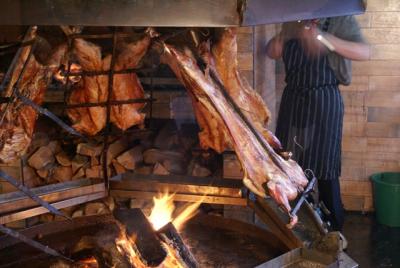
The last day in central Chile... visit to Undurraga vineyard somewhere by the old wine valley...
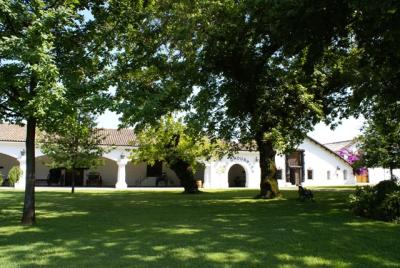
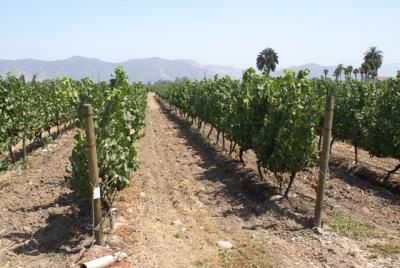
Pinot Noir grapes...

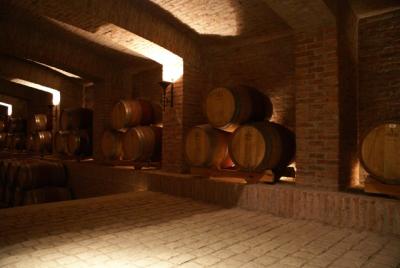
The last evening over the smoggy Santiago...
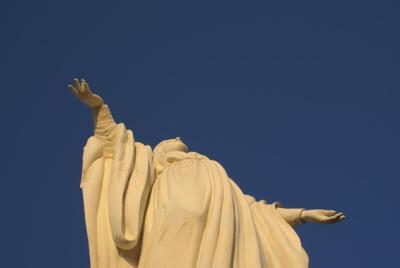
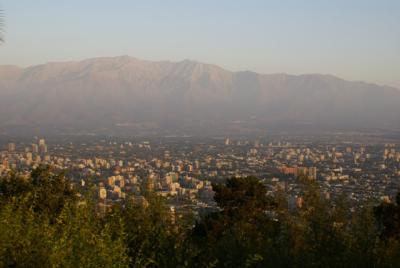
The last hours downtown... watching the changing of la Guardia near the President's office...
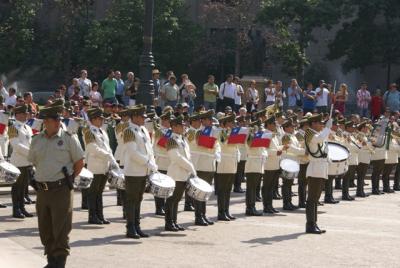
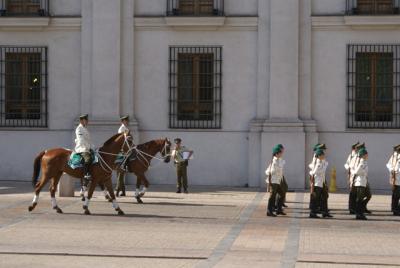
Hasta luego, America del Sur!
The last evening in Patagonia, eating parrilla de lomo...

The last day in central Chile... visit to Undurraga vineyard somewhere by the old wine valley...


Pinot Noir grapes...


The last evening over the smoggy Santiago...


The last hours downtown... watching the changing of la Guardia near the President's office...


Hasta luego, America del Sur!
ieva jusionyte, 12:20h
... link (0 Kommentare) ... comment
Friday, 19. January 2007
Turkish-Armenian writer shot dead
The Turkish-Armenian writer and journalist Hrant Dink, who was one of the writers prosecuted under Turkey's strict laws against "insulting Turkishness", has been shot dead:
http://news.bbc.co.uk/2/hi/europe/6279241.stm
http://news.bbc.co.uk/2/hi/europe/6279241.stm
ieva jusionyte, 10:49h
... link (0 Kommentare) ... comment
Wednesday, 17. January 2007
Stories from South America. The Beagle Channel
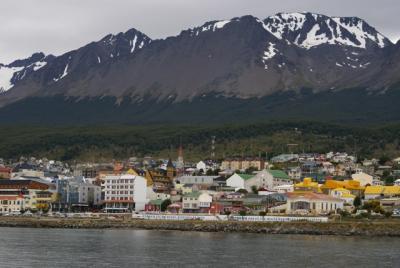
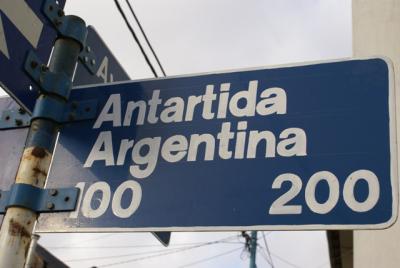
The first European to "discover" Tierra del Fuego in 1520 was Ferdinand Magellan who gave the island this name because, as the legend goes, he thought he was seeing many fires lit by indigenous Fuegians and was scared that they want to attack his fleet. Later on, however, all the locals - Alacaluf, Yamana, Ona and other tribes - disappeared due to the illnesses and the last remaining Yamana now lives in Navarino island, south of the Isla Grande.
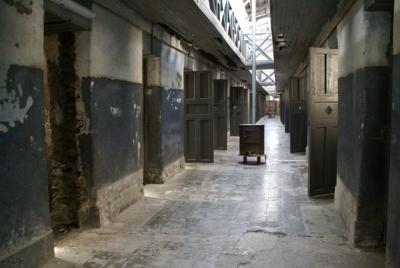
Like most remote islands or even continents in the world Tierra del Fuego was originally a prison and some well-known Argentinian political prisoners that opposed military rule were held here.
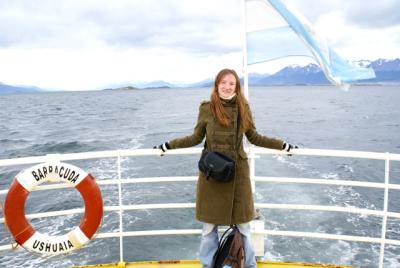
From Ushuaia I set out in the oldest boat carrying tourists in these waters - Baracuda - to explore the Beagle Channel. The channel is so named after capitain Robert FitzRoy's ship that surveyed the coasts of Tierra del Fuego archipelago in early 19th century. Actually, the ship also had Charles Darwin onboard. And he did have what to admire here... Two days among sea lions, cormorans, penguins and albatrosses... I hadn't known that out of 21 species of albatrosses, these amazing seabirds that can travel for miles on end without landing, 19 species are near extinction and that is a lot due to long-line fishing... http://www.savethealbatross.net/ Unfortunately, I did not see any orcas or whales, but they are out in the open Atlantic waters at this time of year. The wind was freezing, but with a group of Italians I had to endure that outside as the inside cabin was full of sick people... the waves rocked the boat for hours. The place is of severe beauty...
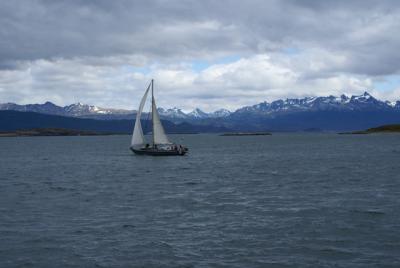
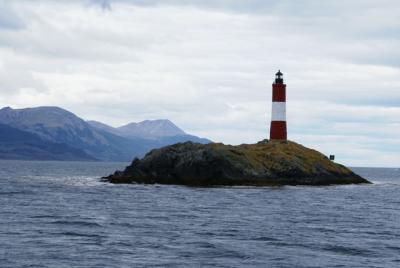
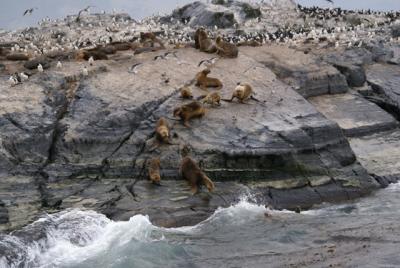
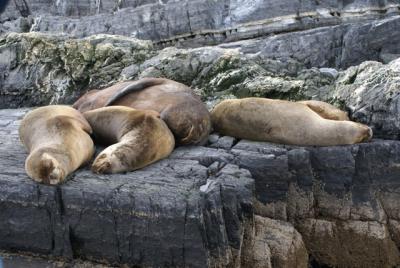
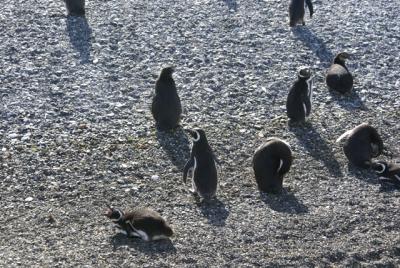
Ships from here to Antarctida cost from two to five thousand dollars for a ten day trip. Not that far and not so impossible:)
ieva jusionyte, 17:01h
... link (2 Kommentare) ... comment
... older stories